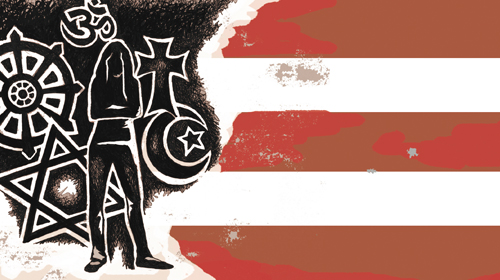
In 1998, Congress created the U.S. Commission on International Religious Freedom to draw attention to violations of religious freedom in other countries. The commissioners vote annually to list countries that are of particular concern or place others on a watch list of countries that should be monitored closely for religious freedom violations.
But, since its inception, the commission's been beset by controversy. People who watch the commission closely say it was created to satisfy special interests, which has in the commission's work. Past commissioners and staff that the commission is "rife, behind-the-scenes, with ideology and tribalism." They've said that commissioners focus "on pet projects that are often based on their own religious background." In particular, past commissioners and staff "an anti-Muslim bias runs through the Commission's work."
The commissioners' personal biases have led to sharp divides both within the commission and with the State Department, which it is supposed to advise. One expert calls the commission's relationship with the State Department and "not conducive to effective dialogue, let alone cooperation." And the divisiveness within the commission itself is obvious, ranging from how it dealt with when a policy analyst claimed her contract with the commission was cancelled to its most recent report in which five commissioners to include of countries of particular concern (alongside a few others like China and North Korea) over the strong objections of the four other commissioners.
Given the commission's history of letting the commissioners' personal biases drive its agenda, in light of recent appointments, it seems especially relevant to look at what two new commissioners have done.
First, Zuhdi Jasser. He is highlighted in a recent that describes a network of Islamophobia "misinformation experts," as someone who "validate[s] and authenticate[s] manufactured myths about Muslims and Islam." His organization a statewide ban on Sharia law, which was later overturned by federal courts because it was blatantly discriminatory and singled out one faith for official condemnation. He has the so-called "radicalization" theory, which conflates First Amendment-protected practices with involvement in terrorism. He narrated the at an NYPD training facility that says American Muslim leaders cannot be trusted and " are attempting to 'infiltrate and dominate America.'" And when it came to light that the NYPD had conducted constitutionally suspect surveillance of the Muslim community in New York and other states, he the department's actions.
Second, Robert George. George also has ties to the Islamophobia industry. He sits on the board of the Bradley Foundation, which the Center for American Progress to organizations that advocate for anti-Islam or anti-Muslim agendas.
But he is better known for his advocacy against the freedom to marry for same-sex couples. He helped author the that would have amended the U.S. Constitution to enshrine discrimination against gay and lesbian couples by limiting marriage to heterosexual couples. He the National Organization for Marriage, which advocates for discriminatory state constitutional amendments on marriage and keeping the so-called Defense of Marriage Act on the books. Throughout his career, George has written about religious liberty; but when he works to enshrine one religious view of marriage over another while some religious faiths and denominations have decided, based on their own religious teachings, to sanction marriage of same-sex couples, he harms this very principle.
Religious freedom means that people of all faiths are able to live and worship without suspicion that they are being targeted by their government and that the law should not be used to promote one set of religious beliefs over others. We hope the commission will be able to condemn these sorts of actions and not be sidetracked by commissioners' personal agendas.
Learn more about religious freedom: Sign up for breaking news alerts, , and .

